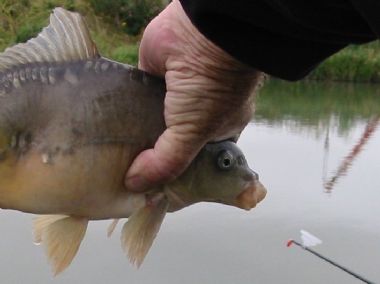What is Pole Fishing?
Pole Fishing is now the most popular method of fishing ponds, lakes, canals and rivers.
Loved by match fishermen, pole fishing is the most precise and sensitive way to "bag up". Bait can be presented in tight spots that are unreachable via other methods of fishing.
 Rather than using the conventional rod and reel, anglers use a long pole (up to 18 meteres in length) to which a length of elastic and then the pole rig (the line, float, weights and hook) are attached.
Rather than using the conventional rod and reel, anglers use a long pole (up to 18 meteres in length) to which a length of elastic and then the pole rig (the line, float, weights and hook) are attached.
Pole rigs are bought ready made up with floats weighted optimally, so that, once at the waterside, all the angler need do is slot together the sections of the pole (unless he has atelescopic pole, in which case, it's even quicker) and attach his rig to the end - and we're away, fishing!
The length of the pole provides incredible accuracy at distances that would not be achieveable using the rod and reel with such light and sensitive rigs. To aid this, poles are incredibly light and usually made of carbon fibre.
However, the length of the pole can be an issue when feeding your swim. Fishing at such distances, accuracy when throwing in bait by hand or with the catapult can be a challenge, especially in windy weather. This is why pole fishermen prefer to use a drip-feeding system, pole pot or or cupping kit, attached near the tip of the pole, and, hence, the float, providing a simple way of feeding the swim.
The pole can be slid backwards and forwards and sections can be added or removed when playing a fish.
Pole floats are incredibly light, although this does not limit the distance from the bank that you can fish. The float is pushed out by the pole, so no weight is needed to gain distance.
Floats are generally made from balsa wood and are much lighter than conventional "rod and reel" floats. This increases bite sensitivity and gives the angler much more information as to what is going on directly beneath his float.
The pole elastic connects the rig to the actual pole. It's elasticity gives the fish something to fight against and, as well as being there to protect the ultra-light rig, tires out the fish much more quickly.
Is there any wonder why fishermen love pole fishing?
